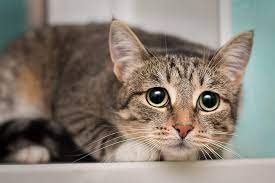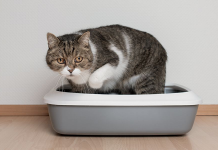Understanding Cat Coughing
Coughing in cats can be an unsettling experience for both feline companions and their owners. It’s crucial to delve into the world of cat coughing to better comprehend its causes, potential triggers, and how to respond.

Common Triggers of Cat Coughing:
Cat coughing can be set off by various factors, ranging from minor irritations to underlying health conditions. Identifying these triggers is the first step in addressing this concern and ensuring your cat’s well-being.
Significance of Recognizing Coughing:
Coughing is your cat’s way of communicating that something isn’t quite right. While occasional coughing might be harmless, persistent or worsening episodes could signal an underlying issue that requires attention and care.
Recognizing Symptoms and Types of Coughs
Identifying Coughing Symptoms:
Cat coughing can manifest in various ways, including hacking sounds, retching, or throat-clearing motions. Observing these symptoms can help you differentiate between normal behavior and potential health concerns.
Types of Cat Coughs:
Understanding the different types of coughs is essential for pinpointing the underlying issue. Cats may experience dry, hacking coughs or productive coughs accompanied by mucus. Each type provides valuable clues about the underlying cause.
Link Between Coughing and Other Issues:
Coughing can be a manifestation of various health problems, such as respiratory infections or allergies. Recognizing any additional symptoms, like wheezing or sneezing, can help identify the root cause of the coughing episodes.
Common Causes of Cat Coughing
Hairballs and Coughing:
One of the most common triggers of cat coughing is the presence of hairballs. When cats groom themselves, they ingest hair, which can accumulate in the stomach and lead to coughing as they try to expel it.
Respiratory Infections:
Viral and bacterial respiratory infections can cause inflammation in a cat’s airways, resulting in coughing. Sneezing, nasal discharge, and lethargy may accompany these infections.
Environmental Irritants:
Cats can be sensitive to environmental irritants like dust, pollen, and smoke. Inhaling these substances can lead to coughing as the body tries to clear the airways.
Respiratory Disorders and Cat Coughing
Feline Asthma and Coughing:
Feline asthma is a common respiratory condition that can lead to frequent coughing episodes. It causes airway inflammation and constriction, resulting in wheezing and coughing.
Chronic Bronchitis:
Similar to asthma, chronic bronchitis in cats involves persistent inflammation of the airways. Coughing, often accompanied by mucus, is a hallmark symptom of this condition.
Heartworm Disease:
Heartworm disease can affect a cat’s respiratory system and lead to coughing. While more commonly associated with dogs, cats can also contract heartworms and exhibit respiratory symptoms.
When to Seek Veterinary Care
Persistent or Worsening Coughing:
If your cat’s coughing persists for more than a few days or worsens over time, it’s crucial to consult a veterinarian. This could indicate an underlying health issue that requires attention.
Additional Symptoms:
If your cat displays other concerning symptoms, such as difficulty breathing, lethargy, or loss of appetite, seek veterinary care promptly. These symptoms could signify a more serious condition.
Diagnostic Assessment:
A veterinarian will conduct a thorough examination, which may include X-rays, blood tests, and lung function tests, to determine the cause of the coughing and recommend appropriate treatment.
Home Remedies and Soothing Techniques
Humidifiers and Moisture:
Using a humidifier in your cat’s environment can help ease respiratory discomfort. Increased humidity can soothe irritated airways and reduce the frequency of coughing.
Steam Sessions:
Creating a steamy environment in your bathroom and allowing your cat to breathe in the moist air can provide relief. Ensure your cat is comfortable and supervised during these sessions.
Natural Herbal Support:
Consult your veterinarian for recommendations on safe herbs or supplements that may alleviate coughing. Never administer any remedies without professional guidance.
Preventive Measures and Lifestyle Adjustments
Regular Grooming:
Brushing your cat’s coat regularly can reduce the ingestion of loose hair, minimizing the risk of hairballs and associated coughing.
Clean Living Space:
Keep your home clean and dust-free to minimize exposure to potential irritants. Regularly clean bedding, carpets, and curtains to create a healthier environment.
Diet and Hydration:
A well-balanced diet and proper hydration contribute to overall feline health. Adequate hydration can help maintain the health of your cat’s respiratory system.
Enhancing Your Cat’s Well-Being
Regular Veterinary Check-ups:
Scheduled veterinary visits are essential for monitoring your cat’s overall health. Regular check-ups allow early detection of potential issues, including respiratory concerns.
Proactive Approach to Care:
By maintaining a proactive approach to your cat’s health, you can reduce the likelihood of coughing and other health problems. Focus on preventive measures and prompt intervention.
Quality Time and Attention:
Spending quality time with your cat not only strengthens your bond but also allows you to monitor their behavior and health. Regular interaction helps you notice any changes in their well-being.
FAQs About Cat Coughing
Q: Why is my cat coughing?
A: Cat coughing can be caused by various factors, including hairballs, respiratory infections, allergies, or underlying health conditions.
Q: Is occasional coughing normal for cats?
A: Occasional coughing may not be a cause for concern, but persistent or frequent coughing could indicate an underlying issue that requires attention.
Q: How can I tell if my cat is coughing?
A: Watch for symptoms like hacking sounds, retching motions, or wheezing. These behaviors are indicative of cat coughing.
Q: Can hairballs lead to coughing in cats?
A: Yes, hairballs can trigger coughing as your cat tries to expel the hair accumulated in their stomach through coughing.
Q: Are there different types of cat coughs?
A: Yes, cats can experience dry coughs, productive coughs with mucus, or even wheezing due to respiratory issues.
Q: What’s the link between cat coughing and respiratory disorders?
A: Cat coughing can be a symptom of respiratory disorders like feline asthma, chronic bronchitis, or even heartworm disease.
Q: When should I be concerned about my cat’s coughing?
A: If your cat’s coughing is persistent, worsening, or accompanied by additional symptoms like difficulty breathing, it’s time to consult a vet.
Q: Can I use home remedies to soothe my cat’s coughing?
A: Some home remedies, like using a humidifier or creating steam sessions, can provide temporary relief, but it’s best to consult a vet for guidance.
Q: How can I prevent cat coughing?
A: Regular grooming, maintaining a clean living space, and ensuring your cat’s overall health through proper diet and hydration can help prevent coughing.
Q: Is veterinary care necessary for cat coughing?
A: Yes, seeking veterinary care is crucial to identify the underlying cause of coughing and receive appropriate treatment for your cat’s specific condition.
Conclusion
As responsible cat owners, understanding the intricacies of cat coughing empowers us to provide the best care for our feline companions. From recognizing symptoms and types of coughs to exploring causes, disorders, and remedies, we’ve delved into a comprehensive guide on this topic.




